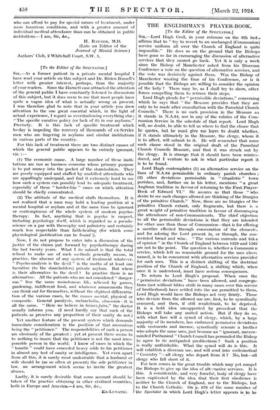[To the Editor of the SPECTATOR.] SIR,—As a former patient
in a private mental hospital I have read your article on this subject and Dr. Risien Russell's letter with greater interest, perhaps, than the majority of your readers. Since the Harnett case attracted the attention of the general public I have constantly listened to discussions of this subject, but it does seem to me that most people have quite a vague idea of what is actually wrong at present. I was therefore glad to note that in your article you drew attention to the one great essential which, in the light of actual experience, I regard as overshadowing everything else : " The specific curative policy (or lack of it) in our asylums." Precisely. It is this lack of specific treatment which to-day is impeding the recovery of thousands of ex-Service men who are lingering in asylums and similar institutions in various parts of the country.
For this lack of treatment there are two distinct causes of which the general public appears to be entirely ignorant, viz. :— • (1) The economic cause. A large number of these insti- tutions are run as business concerns whose primary purpose is to put money into the pocket of the shareholders. They are poorly equipped and staffed by unskilled attendants who are appallingly underpaid, and find it extremely hard to see how such a system can possibly lead to adequate treatment, especially of these " border-line " cases on which attention should be chiefly concentrated.
(2) The attitude of the medical staffs themselves. It is not realized that a man may hold a leading position at a mental hospital or asylum and at the same time be ignorant or contemptuous of the whole system of modern psycho- therapy. In fact, anything that is psycho is . suspect, including psychology itself, which is regarded as a pseudo- science on a par with theosophy and palmistry and certainly much less respectable than faith-healing (for which some physiological justification can be found !).
Now, I do not propose to enter into a discussion of the justice of the claims put forward by psychotherapy during the last twenty years. What I do submit is that the total refusal to make use of such methods generally means, in practice, the absence of any system of treatment whatever. " Psycho-analysis is the devil " is the motto of at least one lucrative (to the shareholders) private asylum. But where is their alternative to the devil ? In practice there is no alternative. All the patients who are not considered " danger- ous " live the same monotonous life, relieved by games, gardening, indifferent food, and whatever amusements they can think out for themselves, without the slightest differentia- tion of the various cases, be the causes mental, physical or composite. General paralysis, melancholia, obsession—it is all the same. " Here we believe in laissez-faire," the doctor usually informs you. (I need hardly say that such of the patients as preserve any proportion of their sanity do not.)
Yet another feature of the present system which demands immediate consideration is the position of that anomalous being the " petitioner." The responsibilities of such a person are obviously of the greatest : yet at present there seems to be nothing to insure that the petitioner is not the most irres- ponsible person in the world. I know of eases in which the " lunatic " could have conceded heavy odds to his petitioner in almost any test of sanity or intelligence. Yet even apart from all this, it is surely most undesirable that a husband or wife should be (as so often at present) the sole petitioner in law, an arrangement which seems to invite the greatest abuses.
Lastly, it is surely desirable that some account should be taken of the practice obtaining in other civilized countries, both in Europe and America.—I am, Sir, &c., Ex-LUNATIC.














































 Previous page
Previous page